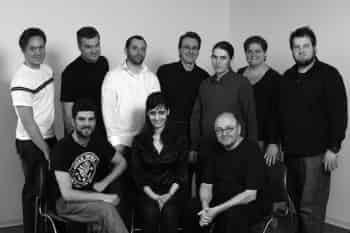Bonus
-
Being confortable with shades of grey
In his preface to the works of Ian Flemming, Francis Lacassin criticized the author of the James Bond stories for having created such black-and-white villains—bad guys that the police feel compelled to shoot on sight the first time they are seen in public because they are just so ugly, ridiculous or flagrantly tasteless. But some heroes can be ugly, just like some villains can be attractive. The same goes for their personalities: heroes as much as villains can display some flaws (like cowardice, for example). Our goal isn’t simply to turn all of the clichés on their heads, but rather, to have characters that offer a wide range of dramatic motivations, rather than just reactions that too often seem contrived.
-
Our Team
-
Specifics about time and place
Our scenes often begin by specifying the location and the date and time. Several months after the first scripts had been written, we reread James Ellroy’s Underworld USA Trilogy, and noticed that he starts each chapter by specifying the city and the day where the action takes place. Surely, this was a subconscious influence on our approach.
Still on the topic of James Ellroy, we love the way he integrates his small plots into the grand scheme of History (with a capital H) and we take something of that away for our own scripts. So even if the action in our story is taking place in a contemporary setting, our heroes won’t affect the course of history. In fact, they are much more likely to be affected by it.
-
The opportunities of the web
The opportunities offered by the web as a publication medium for comics have already been discussed at length by several other people. But one of the benefits that is not often talked about is that it frees us from the constraints of having predefined numbers of pages. Most of the time, book formats are preset and authors have to make their stories meet these requirements. But the internet releases us from these limitations.
-
The Time Factor
When you reread Marvel Essentials stories from the 60s and compare them to DC Showcase from the same era, you really appreciate the genius of Stan Lee and his cronies. The idea of anchoring characters to a known time and place was a real departure from DC’s approach, where characters lived in the fictional Metropolis or Gotham. However, Marvel’s great idea eventually headed south, somewhat. Spiderman, who started off as a teenager in 1962, watched the Twin Towers crumble when he was only in his twenties.
We want time to be a strong dimension of our narrative framework. This implies that our characters age, and consequently, that they evolve because they are aware of their own mortality or because they feel time pushing them in the back, which forces them to accelerate their actions.





